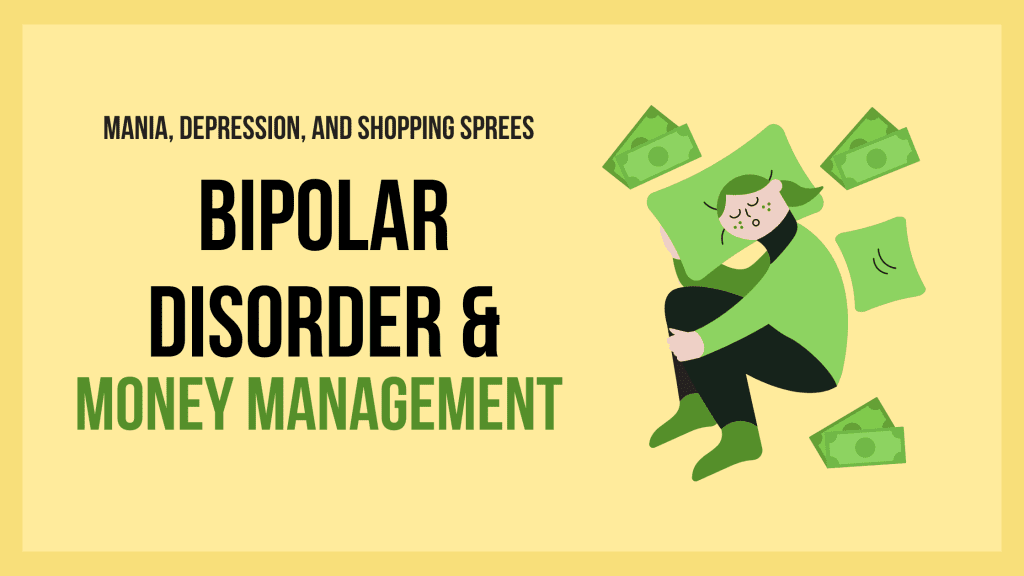Bipolar Disorder & Money Management

Introduction
Bipolar disorder can make money management a real challenge. If you’re dealing with this condition, you’re not alone in your struggle to keep your finances on track. Many people search for ways to control their spending, especially during manic episodes. Let’s explore some effective strategies to help you take charge of your financial health.
Mania, Depression, and Shopping Sprees
Bipolar disorder is known best for extreme mood swings. During manic phases, you might feel an urge to spend money recklessly because of the endless possibilities your mind presents you. All of it seems doable and attainable at once, which leads to spending without care in order to achieve those wild goals and desires. On the depressive side, money management becomes a factor due to a desire to lift one’s mood by buying things in order to feel better.
This impulsive buying can cause serious financial problems such as debt, not being able to pay for life’s necessities like rent, and even stealing money from loved ones. It’s important to recognize this pattern and take steps to prevent it. Below are money management tips to consider for you or your loved one.
For more, in depth, guidance on bipolar disorder, consider purchasing our book or masterclass to support us.
Bipolar Disorder Money Management Tips
Create a Solid Budget:
A budget is your first line of defense against overspending. Here’s how to make one:
- List all your income sources
- Write down all your expenses
- Separate needs from wants
- Set spending limits for each category
- Use apps like Nerdwallet and Monarch or spreadsheets to track your spending. This helps you stick to your budget and spot any unusual spending patterns
Prioritize Needs Over Wants:
As soon as you are paid, pay all of your bills, set aside your savings and investments, and then enjoy your money for pleasure. Automation can be a lifesaver for this method. Try these tips:
- Set up automatic bill payments
- Use direct deposit for your paychecks
- Create automatic transfers to your savings and investments accounts
- By automating your finances, you reduce the risk of forgetting bills or overspending during manic episodes.
Implement Financial Safeguards:
Protecting yourself from impulsive spending is crucial. Consider these bipolar financial safeguards:
- Use low-limit credit cards or prepaid cards
- Remove saved payment information from online shopping sites
- Install website blockers for shopping sites during vulnerable times
- Give legal authority to a trusted individual to take over your finances should you fall into an extremely compromised mental state.
- These measures can help prevent manic spending sprees and protect your financial health.
Establish a Cooling-Off Period:
Impulse control is key to managing finances with bipolar disorder. Try this technique:
- Wait 24 to 48 hours before making any non-essential purchase. Keep it in your shopping cart and see afterwards if you still want to buy it.
- Use this time to evaluate if you really need the item
- Ask yourself if the purchase aligns with your financial goals
- This cooling-off period can significantly reduce impulsive buying and help you make more thoughtful spending decisions.
Enlist Trusted Support:
Manic episodes can be particularly challenging for your wallet. Having a support system is invaluable. Consider these options:
- Ask a trusted family member or friend to oversee your finances during manic episodes
- Give them temporary access to your accounts to monitor for unusual activity
- Discuss your financial goals with them so they can help you stay on track
Use Technology to Your Advantage:
Modern tools can help you manage your money better:
- Set up spending alerts on your bank and credit card accounts
- Use apps that require approval from a trusted person for large purchases
- Explore financial apps designed specifically for people with bipolar disorder
Cash Envelope System:
This old-school method is an effective way to prevent overspending. Try these strategies to keep your spending in check
- Withdraw cash for different spending categories
- Put the cash in labeled envelopes (e.g., groceries, entertainment)
- Once an envelope is empty, stop spending in that category
Mindfulness Techniques:
One of the pillars in the BP Harmony Five Pillars of Bipolar Recovery is Mindfulness. Practicing mindfulness can help you make better financial decisions:
- Take deep breaths before making a purchase
- Ask yourself if the item aligns with your values and goals
- Visualize your financial future and how this purchase might affect it
Financial Recovery
If you’ve experienced financial setbacks due to bipolar disorder, recovery is possible:
- Be patient with yourself and celebrate small victories
- Work on rebuilding your credit score gradually
- Consider debt consolidation or negotiation if you’re struggling with multiple debts
- Prioritize maintaining a job, but if you cannot then consider applying for disabilities funding from the government.
Remember, financial recovery is a journey, not a race. Take it one step at a time.
Conclusion
Money management with bipolar disorder can be challenging, especially in the manic phase, but it’s not impossible. By implementing these strategies and seeking support when needed, you can take control of your spending and work towards financial stability. Remember, every small step counts, and with persistence, you can achieve your financial goals while managing your bipolar disorder effectively.


